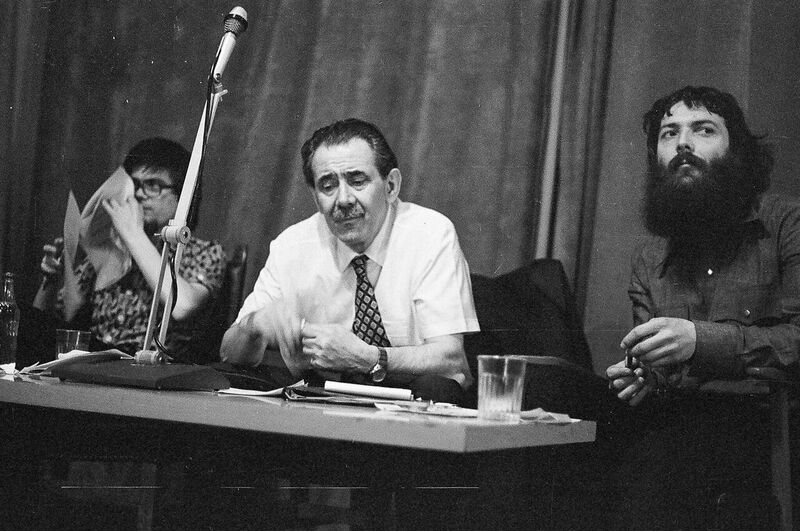Lively political discussions took place within the Közgáz-klub at the Karl Marx University of Economic Sciences (Marx Károly Közgazdaságtudományi Egyetem, or MKKE). These discussions occurred mainly as part of the so-called Polvax. The organizers of these discussions were current and former students who wanted to provide an opportunity for the free expression of different views in the era of soft dictatorship during the 1970s and 1980s. They attempted to create an independent organization for university students to serve as an alternative to the Hungarian Communist Youth League (Magyar Kommunista Ifjúsági Szövetség, or KISZ).
As a result of the student movements in Paris in 1968, alternative notions extending beyond the central ideology and ideas opposing the communist system appeared at universities in Hungary as well. The dissatisfied students wanted open debate and true advocacy rather than the meetings of the Hungarian Young Communist League that lacked genuine content. The various university clubs that existed at this time served as the venues for these discussions.
Club life at the Közgáz-klub became very active in 1976, when Gyula Jobbágy, an assistant lecturer at the Department of Scientific Socialism and former student, became the leader of the club. Social life at the university was very intense and eventful and included the organization of film and jazz clubs, concerts, festivals, and political discussions. The Közgáz-klub edited its own bulletin entitled Klub Közlöny. The tone of articles that appeared in this publication was more critical than those published in the official newspaper of the Karl Marx University of Economic Sciences. Furthermore, some of the students formed a rock band called Neoprimitív. This band was known for rewriting the lyrics of hit songs in order to imbue them with provocative sexual and political content. According to the organizers, many thousands of students attended Közgáz-klub events every month, thus generating admission revenue that provided the club with a larger budget than the university chapter of the Hungarian Communist Youth League (KISZ).
Polvax was the most popular program associated with the club. Polvax operated between 1976 and 1984 as the first political debate club at the university. László Szentirmay, one of the organizers of the Polvax, said in an interview in 2004 that he and his associates had managed to establish “the most exciting political club during the era of soft socialism.” Political leaders such as György Aczél, Károly Grósz, János Berecz, Gyula Horn, Imre Pozsgay, and Rezső Nyers held lectures as part of the debate club. Critical opposition figures were invited to speak at club meetings in addition to dedicated communist party and state leaders. The communist leadership of the university regarded Polvax as the meeting place of dissident students and compared it to the debate circles that had emerged at the time of the 1956 Hungarian Revolution. Polvax was banned on two occasions.
In addition to the club activity, there were attempts to reform the KISZ organizations, though these efforts were unsuccessful. Gyula Jobbágy felt that they had to find another way to represent their own interests. His idea was to establish an independent organization for the students. Therefore, the Meeting of Students from Universities and Colleges in Budapest (Budapesti Egyetemisták és Főiskolások Találkozója, or BEFŐT) was established in 1981. Informants had notified the political police about this plan.
Hungarian Communist Youth League leaders conducted control over meetings, limited and monitored commentary, and filled the audience with loyal KISZ members. They eventually made it impossible to hold events in their original form and the essence of the BEFŐT was lost. Posters bearing the name of the organization were banned because they were deemed “revolutionary.” The rector of the university threatened Gyula Jobbágy, charging him with having engaged in anti-state conspiracy. At the BEFŐT meeting held on 20 March 1981, the idea of an independent student forum appeared only in very faint form. The project had failed. Many students were disappointed because the meeting had been powerless. As a result of threats, Gyula Jobbágy did not speak at all.
Polvax restarted in 1983 as
Poltár, but as a result of political censorship, the organizers were forced to abandon their original objectives. Since they did not want to proceed in this way, the Poltár was brought to an end the next year. However, the history of Polvax restarted in 2011, when László Szentirmay organized the “Poltár of the modern era.” Its profile did not change, thus remaining a forum for political debate and other topics associated with public life.

